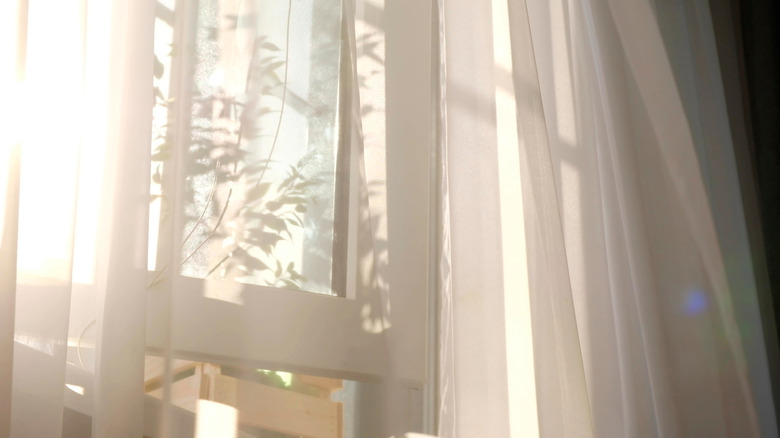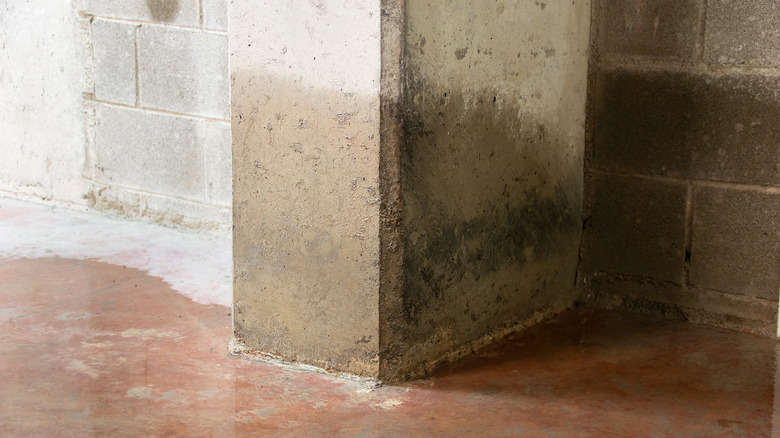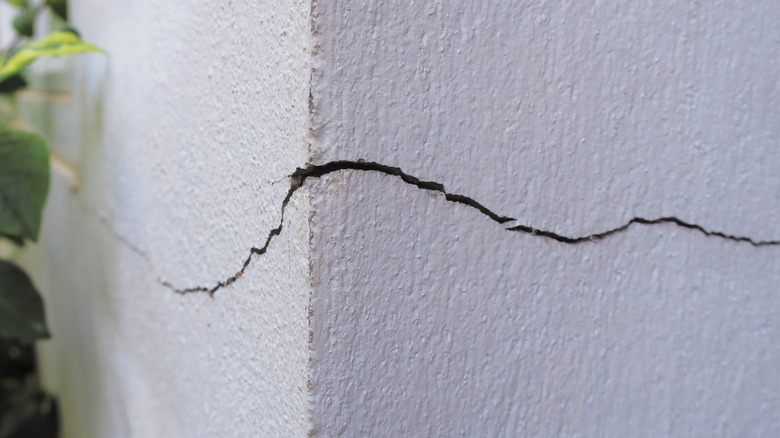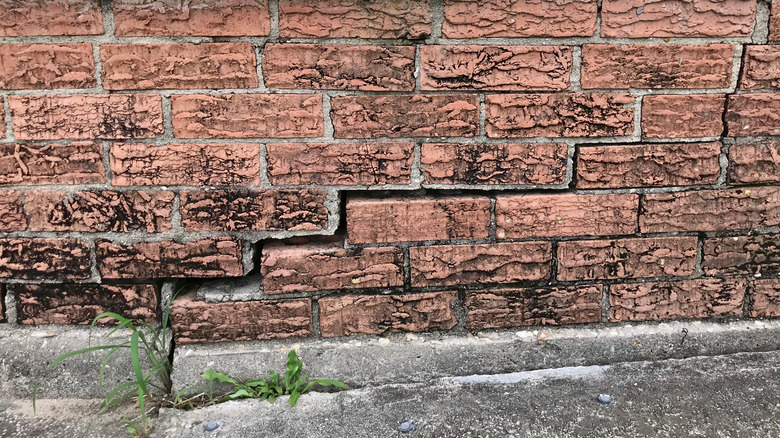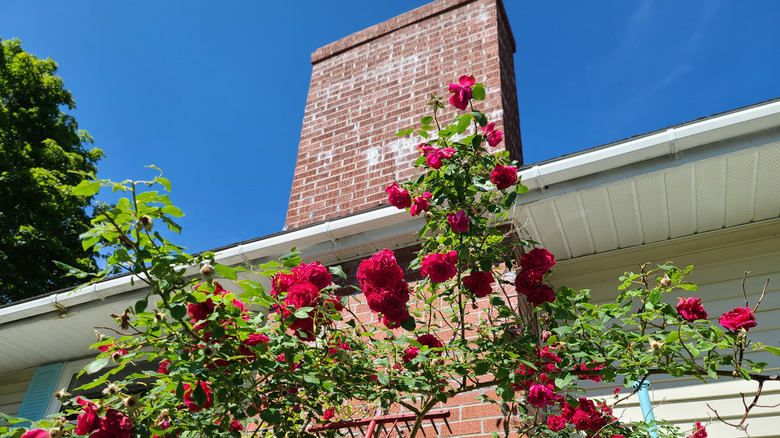5 Signs That Your Home's Foundation Is Settling
One of a homeowner's worst nightmares is foundation problems. Structural issues are difficult and extremely expensive to repair, wreaking havoc on the home itself and your bank account. The good news is that settling is a normal occurrence for a home. According to Magnum Piering, foundation settling is the natural process of a home sinking slightly into the ground, something that happens slowly over many years.
While some settling is to be expected, foundation problems occur when a home settles too quickly, often because of improper ground preparation or poor-quality foundation. Large tree roots can also cause foundation problems. Mr. Tree Services states the distance you should plant a tree from your home's foundation depends on the size of the tree at maturity. Trees less than 30 feet tall can be planted as close as 8 feet from the home. Plant trees that grow around 70 feet tall no closer than 15 feet from the home and those that can grow over 70 feet tall must be placed at least 20 feet away.
1. Sticking doors and windows
Most foundation settling happens in the first couple of years. You might notice that your windows and doors become more difficult to open. Interior and exterior doors can be affected. A sticking door is not necessarily a foundation issue. According to Bay Crawlspace, doors may stick because of changes in the seasons. Hot and cold temperatures and a humid room or lack of humidity can cause wooden doors to expand or contract. Foundation settling may be the cause when you notice your doors stick year round.
Much like doors, windows can start to stick as your foundation shifts and settles. Forde Windows & Remodeling states that home settling can cause a difference in pressure on the frame of your window, making them more difficult to open. Thankfully, foundation problems are not the only reason for sticky windows. Lack of lubrication, damage to the frame, and dirt and grime can all make windows difficult to open, so check for these signs first.
2. Moisture in the basement
If you suddenly discover water pouring into your basement after it rains, you may have significant problems because of foundation settling. If water can get in, there is likely damage to the foundation, and you should call a professional as soon as possible to assess the damage. Magnum Piering states it is possible for water to enter a basement even when the foundation is not damaged, but regardless of the cause, standing water in your home can lead to more problems. Identify and resolve the problem as soon as possible to avoid bigger issues in the future.
Standing water in the basement is not the only sign of foundation settling. Foundation Recovery Systems suggests cracked floors and walls allow water to slowly trickle into your basement, increasing the humidity. Too much humidity can not only cause the space to smell bad, but it can also lead to mold growth. If your basement feels damp, check for cracks in the walls and floors.
3. Cracks in the walls
Cracks in your walls can occur for several reasons, some of which are a nuisance, but not a cause for concern. Because of the normal process of a home's foundation settling over time, you might notice small cracks around doors and windows. According to Eden's Structural Solutions, weather changes cause the ground to shift a little bit, which creates tiny cracks in the areas of walls that are weakest, like those caused by natural foundation settling. These types of hairline cracks are normal and can be repaired with some tape and spackle to restore your room's aesthetics.
Deeper cracks are more of a concern. A large crack in any part of the wall or ceiling indicates the possibility of a significant foundation shift. The same is true if numerous cracks appear in a short amount of time. If you notice cracks suddenly appearing, getting larger, or anything that looks concerning, call a foundation repair professional.
4. Cracks in the foundation
Although it can be scary to see cracks in your foundation, not all are detrimental. Family Handyman states that most homes have foundation cracks. Even a new home could show cracks within the first year. The important thing to note is the different types of cracks: diagonal, horizontal, stair-step, and vertical.
Diagonal cracks are a concern because they could indicate that the foundation is not settling evenly. Horizontal cracks tend to appear after significant rainfall if water often pools around your foundation. The pressure of the water on foundation walls creates this type of crack, which should be examined by a professional. Stair-step cracks are similar to horizontal cracks in that they need to be monitored. These cracks could indicate an uneven foundation. Vertical cracks are the least concerning and are the most common. They are caused by normal foundation settlement.
As you inspect the exterior of your home, make note of the types of cracks you see, if any. In most cases, the larger the crack, the more likely it is to be caused by an uneven foundation.
5. Gaps around the house
Have you noticed gaps between the surfaces of your home that should be firmly attached? This can occur indoors or out. According to Helitech, if your chimney is pulling away from your house, you could have foundation problems. The issue could be confined to only the foundation under your chimney, or it could be a more widespread problem. Regardless of the cause, if there are gaps between your chimney and home, address the issue immediately.
You might also see gaps throughout the interior of your home. When your foundation settles, you may notice more space between your floor and floorboards. Ceiling trim may also separate from the wall or ceiling. In bathrooms and kitchens, foundation issues can cause cabinets to separate from walls. Any time there is a gap where surfaces should be attached is concerning, especially if the gaps continue to increase in size. The cause may not be a bad foundation, but it is best to call a professional so the problems do not worsen.

